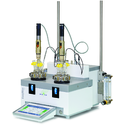High-Purity Lithium Carbonate via Controlled Crystallization
Leveraging PAT to Guide and Optimize a Novel Continuous Crystallization Technology to Access High-Purity Battery Materials and Critical Minerals
Panoramica del programma
- Understand how to utilize and apply the EasyViewer technology to monitor and control the crystallization process.
- Learn how to apply online ion chromatography as an analytic tool for tracking and managing the purity of the lithium extraction process.
- Learn about the real-world application and scalability of the method through the successful construction of a pilot plant in partnership with Standard Lithium, emphasizing its potential for industrial applications
This webinar will discuss an innovative approach to lithium extraction - continuous flow crystallization. This methodology offers a single-step production of battery-grade Li2CO3 from low-grade LiCl or very impure Li2CO3 stock material. With a lithium recovery rate of 67%, it showcases an economical way to tap into globally abundant low-grade sources, diversifying the lithium supply chain. Furthermore, the process demonstrates robust versatility, with tolerance for varying feedstock concentrations and natural impurities.
Telescope Innovations's recent partnership with Standard Lithium resulted in the successful construction of a pilot plant processing 1200 L of brine, emphasizing the scalability and potential of this groundbreaking technology. The webinar will also shed light on the suite of online analytics enabling careful control over crystallization rate and rapid scale up.
Target Audience
Researchers interested in process crystallization and merging online analytical PAT with crystallization development workflows.
Speakers

Jason Hein
CEO/Director, Telescope Innovations
Jason Hein is an Associate Professor of Chemistry at the University of British Columbia, an Adjunct Professor at the University of Bergen, Norway. Prof. Hein was the co-lead of Project ADA; the world's first autonomous discovery platform for thin film materials, supported by Natural Resources Canada, co-PI of the MADNESS team supported by the DARPA Accelerated Molecular Discovery Program and the UBC lead for the Acceleration Consortium CFREF spearheaded by the University of Toronto. Jason has also translated his passion for developing enabling technology by becoming the CEO and founder of Telescope Innovations; a chemical technology start-up creating AI-enabled automation solutions for process chemical development. He received his B.Sc. in Biochemistry in 2000 and Ph.D. in asymmetric reaction methodology in 2005 from the University of Manitoba (NSERC PGS-A/B, Prof. Philip G. Hultin). In 2006, he became an NSERC postdoctoral research fellow with Prof. K. Barry Sharpless and Prof. Valery V. Fokin at the Scripps Research Institute in La Jolla, CA. In 2010, he became a senior research associate with Prof. Donna G. Blackmond at the Scripps Research Institute. He began his independent career at the University of California, Merced in 2011, employing in-situ kinetic reaction analysis to rapidly profile and study complex networks of reactions. In 2015, he moved to the University of British Columbia and was promoted to Associate Professor in 2019. His research has resulted in a collection of prototype modular robotic tools and integrated analytical hardware which create the first broadly applicable automated reaction profiling toolkit geared toward enabling autonomous research and discovery.





